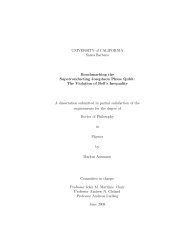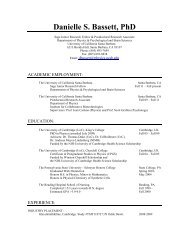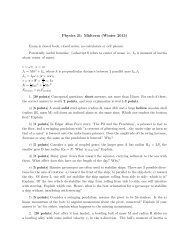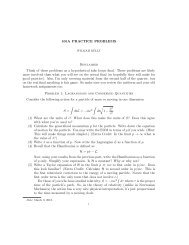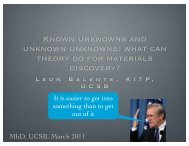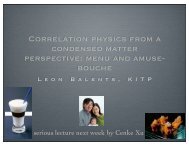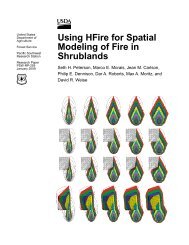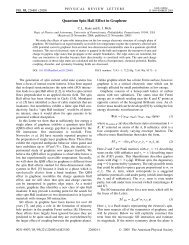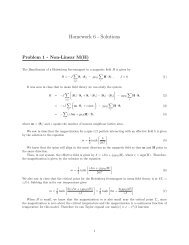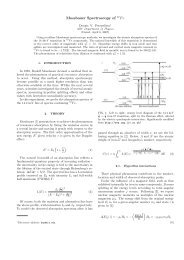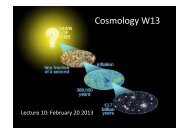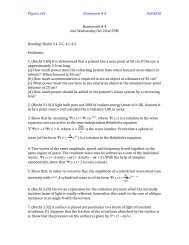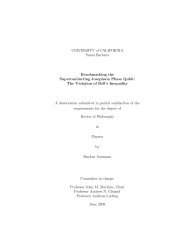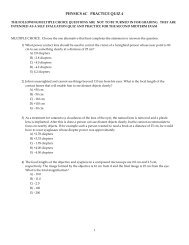Notes on Relativity and Cosmology - Physics Department, UCSB
Notes on Relativity and Cosmology - Physics Department, UCSB
Notes on Relativity and Cosmology - Physics Department, UCSB
Create successful ePaper yourself
Turn your PDF publications into a flip-book with our unique Google optimized e-Paper software.
9.4. STRETCHING AND SQUISHING 253<br />
that it stretches the ocean in the directi<strong>on</strong> pointing toward (<strong>and</strong> away from)<br />
the mo<strong>on</strong>, while it squishes (or compresses) the ocean in the perpendicular<br />
directi<strong>on</strong>s. This is because different parts of the ocean would like to separate<br />
from each other al<strong>on</strong>g the directi<strong>on</strong> toward the mo<strong>on</strong>, while they would like to<br />
come closer together in the other directi<strong>on</strong>s:<br />
Ocean<br />
Wants to come<br />
together in this<br />
directi<strong>on</strong><br />
Earth<br />
Mo<strong>on</strong><br />
Wants to separate this way.<br />
As stated in the homework soluti<strong>on</strong>s, this effect is resp<strong>on</strong>sible for the tides<br />
in the earth’s oceans. (You know: if you st<strong>and</strong> at the beach for 24 hours, the<br />
ocean level rises, falls, then rises <strong>and</strong> falls again.) Whenever gravity causes<br />
freely falling observers (who start with no relative velocity) to come together<br />
or to separate, we call this a tidal effect. As we have seen, tidal effects are the<br />
fundamental signature of spacetime curvature, <strong>and</strong> in fact tidal effects are a<br />
direct measure of spacetime curvature.<br />
Of course any other object (a pers<strong>on</strong>, rocket ship, star, etc.) would feel a<br />
similar stretching or squishing in a gravitati<strong>on</strong>al field. Depending <strong>on</strong> how you<br />
are lined up, your head might be trying to follow a geodesic which would cause<br />
it to separate from your feet, or perhaps to move closer to your feet. If this<br />
effect were large, it would be quite uncomfortable, <strong>and</strong> could even rip you into<br />
shreds (or squash you flat).<br />
However, as we have seen, this effect is generally small for geodesics that are<br />
close together: if the st<strong>on</strong>es in problem 1 were <strong>on</strong>ly as far apart as your head<br />
<strong>and</strong> feet are, the effect would have been completely negligible! So, unless the<br />
spacetime curvature is really big, it usually does not harm small objects like<br />
people – <strong>on</strong>ly large objects like planets <strong>and</strong> stars.<br />
On the other h<strong>and</strong>, we argued that this tidal effect will become infinitely<br />
large at the singularity of a black hole. There the effect certainly will be str<strong>on</strong>g<br />
enough to rip apart even tiny objects like humans, or cells, or atoms, or even<br />
subatomic particles. It is therefore of interest to learn how to compute how<br />
str<strong>on</strong>g this effect actually is. We know that it is small far away from a black<br />
hole <strong>and</strong> that it is large at the singularity, but how big is it at the horiz<strong>on</strong>?<br />
This last questi<strong>on</strong> is the key to underst<strong>and</strong>ing what you would feel as you fell<br />
through the horiz<strong>on</strong> of a Schwarzschild black hole.<br />
These are exactly the questi<strong>on</strong>s we’re going to ask (<strong>and</strong> answer) in the current<br />
secti<strong>on</strong>. We will investigate tidal effects in more detail <strong>and</strong> discover how to<br />
compute them directly from the metric. Before we begin, I should warn you that<br />
this will be <strong>on</strong>e of the more technical secti<strong>on</strong>s of these notes as the derivati<strong>on</strong>s<br />
are quite involved. It is sufficiently technical that I will almost certainly not go



